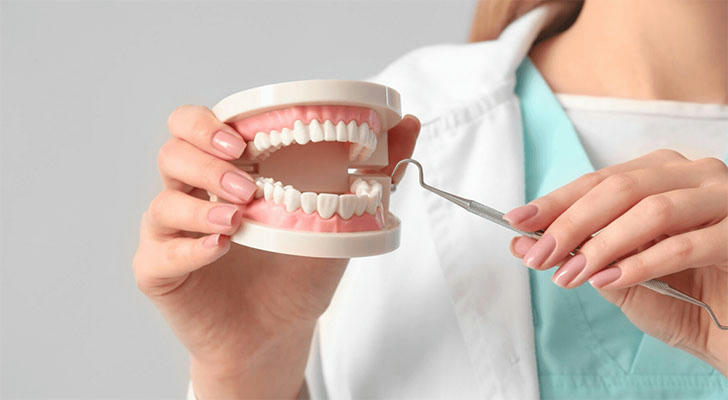Super Practical! 10 Small Tips to Maintain Your Dental Health

Maintaining good dental health is essential not only for a bright smile but also for overall well-being. While brushing and flossing are fundamental, there are many small but effective tips that can enhance your dental care routine. Here are ten practical tips to keep your teeth and gums healthy:
1. Brush Correctly and Consistently
Brushing your teeth twice a day is crucial, but technique matters just as much. Use a soft-bristled toothbrush and fluoride toothpaste. Brush for at least two minutes, ensuring you cover all surfaces of your teeth and gums. Apply gentle pressure and use short, circular strokes to effectively remove plaque and food particles. Brush your tongue as well to eliminate bacteria and freshen your breath. Replace your toothbrush every three to four months, or sooner if the bristles become frayed, as worn toothbrushes are less effective at cleaning your teeth.
2. Don't Skip Flossing
Flossing removes plaque and food particles from between your teeth and under the gumline, where your toothbrush can't reach. Aim to floss at least once a day, using about 18 inches of floss. Gently guide the floss between your teeth using a rubbing motion, then curve it into a C-shape against one tooth and gently slide it beneath the gumline. Repeat on the adjacent tooth. Use a gentle sawing motion to avoid damaging your gums. Consider using floss picks or interdental brushes if traditional floss is difficult for you to maneuver.
3. Use Mouthwash
Incorporate an antimicrobial mouthwash into your routine to help reduce plaque, prevent gum disease, and freshen your breath. Choose a mouthwash with the American Dental Association (ADA) Seal of Acceptance for proven effectiveness. Rinse according to the product instructions, usually for about 30 seconds. Swish the mouthwash vigorously to ensure it reaches all areas of your mouth.
4. Stay Hydrated
Drinking plenty of water throughout the day helps keep your mouth hydrated and aids in washing away food particles and bacteria. Water also helps maintain a neutral pH level in your mouth, reducing the risk of tooth decay. Saliva production is crucial for maintaining a healthy mouth, and staying hydrated promotes adequate saliva flow. Avoid sugary drinks and opt for water instead to minimize the risk of cavities.
5. Choose a Tooth-Friendly Diet
A balanced diet rich in fruits, vegetables, lean proteins, and whole grains supports healthy teeth and gums. Fruits and vegetables with a high water content, such as apples, carrots, and celery, help produce saliva and scrub your teeth. Lean proteins provide essential nutrients for gum health, while whole grains are high in fiber and low in sugar. Limit sugary snacks and drinks, as they can contribute to tooth decay. Foods high in calcium and vitamin D, such as dairy products, leafy greens, and fatty fish, strengthen your teeth and bones.
6. Avoid Smoking and Chewing Tobacco
Smoking and chewing tobacco can lead to gum disease, tooth discoloration, and oral cancer. Tobacco use stains your teeth, causes bad breath, and increases your risk of developing oral infections. Quitting these habits improves not only your oral health but also your overall health. If you need help quitting, consult your healthcare provider for support and resources, such as nicotine replacement therapy or counseling.
7. Use a Mouthguard
If you play contact sports or grind your teeth at night, consider wearing a mouthguard. Mouthguards protect your teeth from injury and prevent damage caused by bruxism (teeth grinding). Custom-fitted mouthguards from your dentist offer the best protection, as they are molded to your specific bite and provide a comfortable, secure fit. Over-the-counter mouthguards are also available, but they may not provide the same level of customization and protection.
8. Regular Dental Check-Ups
Schedule dental check-ups and cleanings every six months, or as recommended by your dentist. Regular visits help detect and address dental issues early, preventing more serious problems down the line. Your dentist will examine your teeth and gums, perform a professional cleaning to remove plaque and tartar buildup, and provide personalized advice based on your oral health. They may also recommend additional treatments, such as fluoride applications or sealants, to protect your teeth.
9. Limit Acidic Foods and Beverages
Acidic foods and drinks, such as citrus fruits, sodas, and wine, can erode tooth enamel over time. If you consume these items, try to rinse your mouth with water afterward and wait at least 30 minutes before brushing to avoid enamel damage. Acid weakens the enamel, making it more susceptible to erosion from brushing. Chewing sugar-free gum after meals can also help stimulate saliva production, which helps neutralize acids and wash away food particles.
10. Practice Good Oral Hygiene for Your Whole Family
Encourage good dental habits in your family by setting a positive example. Teach children proper brushing and flossing techniques, and make dental care a regular part of your family routine. Healthy habits formed early can lead to a lifetime of good oral health. Involve your children in choosing their own toothbrushes and toothpaste flavors to make the experience more enjoyable. Regularly praise them for their efforts and celebrate milestones, such as their first dental visit or cavity-free check-up.
Conclusion
By incorporating these small but effective tips into your daily routine, you can significantly improve your dental health and maintain a beautiful, healthy smile. Remember, consistency is key, and proactive care is essential for preventing dental problems and ensuring your teeth and gums stay in top condition. Start today and enjoy the benefits of a healthier mouth and overall well-being! Your teeth will thank you for taking the time to prioritize your oral health.
